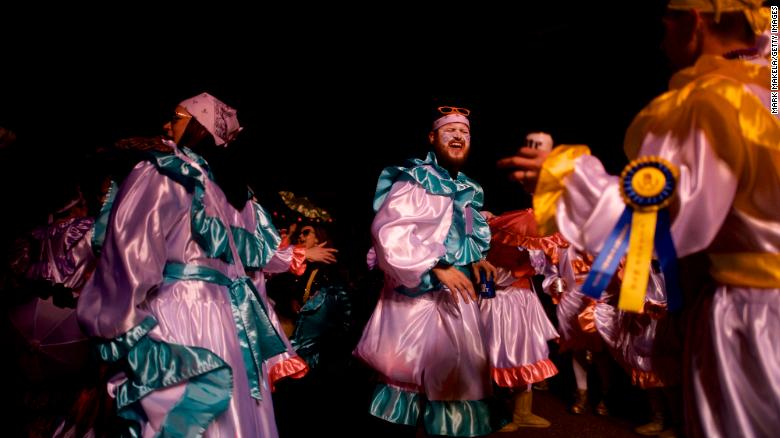By Sahar Akbarzai, CNN
New York (CNN)America’s oldest folk parade returns Sunday after coronavirus shut down the New Year’s Day tradition that has come under scrutiny for racist and other offensive costumes worn by some participants throughout the years.Thousands are expected to attend and participate in Philadelphia’s time-honored Mummers Parade despite rising Covid-19 cases, locally and nationally, due to the Omicron variant. Normally, the event is held on New Year’s Day, but a forecast of rain pushed it to January 2 this year.Mummers will celebrate in the streets and perform skits and parodies in costumes, but this year’s revelers will be more culturally sensitive, organizers and participants say.
In recent years, some participants in the parade have donned anti-semitic, transphobic and racist costumes — including blackface — according to Shira Goodman, director of Campaigns and Outreach at the Anti-Defamation League.
“There’s a troubling history there,” Goodman told CNN.
But Mummers leadership and city officials said they have put in additional safeguards to address past inappropriate and offensive conduct, Kevin Lessard, director of communications for the mayor of Philadelphia, told CNN.
Trainings, all skits and performances must be approved by the human relations commission first, and clubs or individuals found out of compliance will be banned from Mummer’s Association and future parades, he said.In 2016, all Mummers began to receive cultural and racial sensitivity training after complaints about some of the costumes and parodies. The training included understanding cultural appropriation, rules of satire and LGBTQ cultural competence, Maita Soukup, a city spokesperson, told CNN.
Recent controversies
In recent years, some Mummers wore blackface even though it was banned in 1963 after the local branch of the NAACP and the Congress of Racial Equality persuaded the then-director of the parade to forbid it, Catherine Hicks, president of Philadelphia’s NAACP branch, told CNN. The decision sparked anger among many Mummers, who protested the ban, according to Temple University Libraries’ Special Collections Research Center.Despite the ban and recent trainings, some Mummers had continued to don blackface. The most recent incident was in the 2020 parade.

Fiasco group Mummers dance on 2nd Street during night partying on January 1, 2019 in Philadelphia, during the Mummers Parade.”
The use of blackface by someone affiliated with Froggy Carr today was abhorrent and unacceptable. This selfish, hateful behavior has no place in the Mummers, or the city itself. We must be better than this. The group was disqualified, and we will be exploring additional penalties,” Philadelphia Mayor Jim Kenney tweeted at the time.Hicks said, “the history of blackface is very disturbing and it’s very sensitive when it comes to the African American community. People should do their homework before they dress up as any character because it can be offensive to a minority group.””People might think it’s a joke or dressing up as character, but it brings back a lot of feelings of being enslaved,” she added.Additional training ahead of the 2022 parade included bias awareness training, Soukup said.Veteran Mummers acknowledge there have been some issues over the years but say it’s not the majority of members.Sam Regalbuto, a Mummer and president of the String Band Association, told CNN the individuals who donned blackface in 2020, “were two individuals who are not 365-days-a-year Mummers, had a political ax to grind in the city of Philadelphia with politicians. They used us as a platform to make their political statement that day and ruined it for all of us. Those individuals have been banned. People who have a political ax to grind aren’t welcome in our parade. We have rules and bylaws that we follow.”
Read more of the orginal article via CNN

